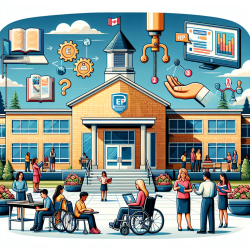The recent research article, "The Role of Speech-Language Pathologists in Developing Language Rich Classrooms," by Curt Dudley-Marling and Christine Dudley-Marling, delves into the transformative role speech-language pathologists (SLPs) can play beyond traditional clinical settings. By stepping into classrooms, SLPs have the unique opportunity to enrich language-learning environments, thus enhancing the communicative competence of language-disordered children.
Traditionally, the focus of speech-language therapy has been within a clinical setting, which can sometimes limit a child's exposure to natural conversational settings and, consequently, their ability to learn and apply language in various contexts. The article argues for the integration of SLPs into classroom environments where they can work collaboratively with teachers to create a more inclusive and language-rich atmosphere.
One of the key insights from the article is the importance of creating classrooms that encourage active participation and communication among students. This involves shifting away from teacher-dominated discussions and towards more student-centered interactions. By doing so, students are provided with a broader range of conversational settings and purposes for using language, from expressing opinions to solving problems collaboratively.
SLPs can contribute significantly to this transformation by advising teachers on how to adapt their communication styles and classroom management techniques to support language development. This includes strategies such as matching language complexity to the students' needs, increasing wait times after asking questions to give students more time to formulate responses, and using open-ended questions to encourage longer and more complex student utterances.
Moreover, the article highlights the potential for SLPs to help teachers create a physical classroom environment that promotes language use. This can be achieved through the arrangement of the classroom to facilitate small group interactions and the inclusion of stimulating materials and objects that encourage discussion and storytelling.
Implementing these strategies requires a collaborative effort between SLPs and teachers, with the shared goal of enhancing the communicative competence of all students, particularly those with language disorders. By working together, they can create a classroom environment that not only supports the goals of speech-language therapy but also integrates these goals into the fabric of everyday learning.
In conclusion, the role of speech-language pathologists in educational settings is evolving. By moving beyond the confines of the clinic and into the classroom, SLPs have the opportunity to make a profound impact on the language development of children. Through collaboration with teachers, they can help foster environments where language is not only learned but actively used in meaningful ways throughout the day.
To read the original research paper, please follow this link: The Role of Speech-Language Pathologists in Developing Language Rich Classrooms.










